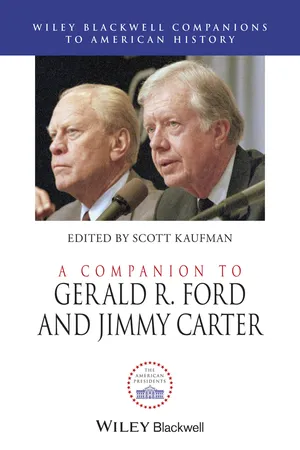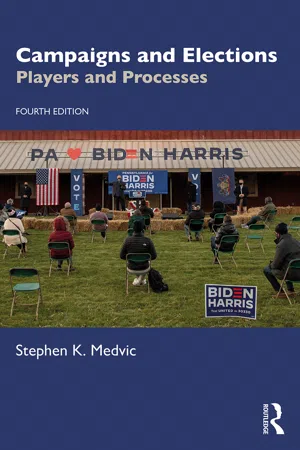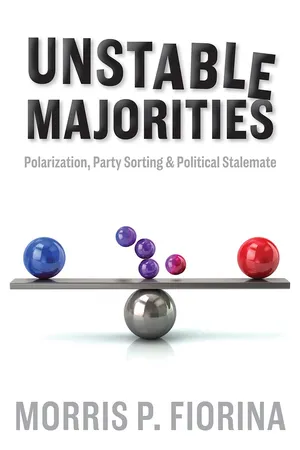History
1988 Presidential Election
The 1988 Presidential Election was held in the United States between Republican candidate George H.W. Bush and Democratic candidate Michael Dukakis. Bush won the election with a significant margin in both the popular vote and the electoral college, becoming the 41st President of the United States.
Written by Perlego with AI-assistance
Related key terms
Related key terms
1 of 4
Related key terms
1 of 3
3 Key excerpts on "1988 Presidential Election"
- eBook - ePub
- Scott Kaufman, Scott Kaufman(Authors)
- 2015(Publication Date)
- Wiley-Blackwell(Publisher)
Détente and Confrontation (1994). In any case, Soviet aggressiveness had escalated over the previous twenty years, an evolution that was traced by Bruce D. Porter (1984) and that was widely seen as ominous by the public. By 1980, large majorities said they supported a US defense build-up and a tougher stance vis-à-vis the Soviet Union.Outside of the Iranian trauma and East–West conflict, other key changes were taking place in the international context, often barely noticed by analysts focused on the Cold War. In The Shock of the Global, edited by Niall Ferguson, Charles S. Maier, Erez Manela, and Daniel J. Sargent (2010), twenty-one chapters attend to the rise of globalization in economic and other realms including human rights, cross-national political Islam, popular culture, and public health.The Campaign and Election
As is often the case, the first lengthy interpretations of the election of 1980 came in the form of journalistic accounts by political reporters. The first of these was The Pursuit of the Presidency 1980 (1980) edited by Richard Harwood and consisting of a collection of essays by Washington Post reporters. Coming out only weeks after Election Day, The Pursuit of the Presidency traced the campaign month-by-month and declared the election “the most astonishing landslide in American history” (Harwood, 1980: cover). Over the next two years, Elizabeth Drew (1981), Jack Germond and Jules Witcover (1981), and Theodore White (1982) joined the conversation. In America in Search of Itself, White provides a journalistic account but also puts 1980 into the context of presidential elections since his first The Making of the President books made him famous in 1960.Of course, participants in the election have offered a variety of explanations and interpretations. It is customary for the losing side to complain about the injustice—and the winning side to trumpet the justice—of the electoral verdict, and memoirs of the 1980 election are no exception. The most important participants were the presidential candidates themselves, who, unsurprisingly, have fundamentally different understandings of what happened in 1980. In his memoir Keeping Faith - eBook - ePub
Campaigns and Elections
Players and Processes
- Stephen K. Medvic(Author)
- 2021(Publication Date)
- Routledge(Publisher)
10 ElectionsDOI: 10.4324/9781003125099-10E LECTION DAY is the culmination of months, perhaps years, of campaigning. On that day, the voters reach a collective decision about who will lead their city, state, or nation. When the principles of democracy are widely held and the norms of democratic transition are well established, those vying for power will accept the voters’ verdict without a violent struggle (although all too often in the United States, legal battles may ensue). But even in well-established democracies, peaceful transitions are precarious, as the events at the US Capitol on January 6, 2021, demonstrated. If we were to examine the entire history of humankind, we’d find that the nonviolent transfer of power has been a rare occurrence.Election results possess considerable power. They can bring about significant change in society and set the course for public policy that will affect not only the United States but the rest of the world as well. It matters, therefore, who wins elections. It is not an exaggeration to say that the course of history would have been different had, for example, Al Gore been sworn in as president on January 20, 2001, instead of George W. Bush.Of course, not every election is as momentous as the 2000 election. After a brief discussion of the uniqueness of presidential elections, this chapter explores the categorization of elections. It then turns to an explanation of how election outcomes are determined. If elections are as important as has been suggested here, it is worth understanding the factors that influence them. Particular attention is paid to the question of whether, given the predictability of elections, campaigns have any impact. Finally, the chapter asks whether election winners can ever legitimately claim a “mandate” from their victories. - eBook - ePub
Unstable Majorities
Polarization, Party Sorting, and Political Stalemate
- Morris P. Fiorina(Author)
- 2017(Publication Date)
- Hoover Institution Press(Publisher)
CHAPTER 10 The 2016 Presidential Election—An Abundance of ControversiesEven by the colorful standards of presidential primaries, the 2016 election cycle has been filled with jaw-dropping, head-scratching moments .—Eric BradnerWhile the world celebrates and commiserates a Donald Trump presidency, one thing is clear: this will go down as the most acrimonious presidential campaign of all .—Rachel ReveszControversial presidential elections are nothing new in American electoral history, 2016 being the latest, but certainly not the first. Despite much apocalyptic commentary, however, the implications of the 2016 election seem less dire than those of some elections held in earlier eras. The four-candidate 1860 election started the country on the path to civil war and the disputed election of 1876 threatened to reignite that conflict. In more recent times, the strong showing of a racist third party in 1968 coupled with political assassinations and civil disorders on a scale not seen since the labor violence of the early twentieth century led some contemporary observers to believe that the country was “coming apart.”1 The 2000 Florida electoral vote contest raged for more than two months, threatening a constitutional crisis and deeply dividing partisan activists on both sides. Still, even allowing for the fact that secession and revolution are not seriously on the table, for the sheer number and breadth of the controversies that accompanied it, the 2016 election does seem out of the ordinary.Parties have nominated flawed candidates before—Republican Barry Goldwater in 1964 and Democrat George McGovern in 1972, for example—but at least since the advent of scientific survey research, no major party has nominated a candidate so wanting in the eyes of the electorate, let alone both doing so simultaneously. Charges of ethnocentrism and racism are as American as apple pie, but in their prevalence and virulence in 2016 (with misogyny added to the toxic mix) they were reminiscent of 1928, if not the late nineteenth century.2 “Biased media” is a complaint common to all elections, but the retreat from objectivity by the mainstream media in 2016 struck many observers as a significant break with modern journalistic practices.3 The increasingly visible role of social media like Twitter threatened to further diminish the importance of the legacy media. Swing voters, largely missing in action in recent elections, suddenly reappeared in 2016.4 Possible foreign intervention in the election was a new development (at least insofar as the United States was the intervenee rather than the intervener), as was FBI involvement (but possibly only because earlier instances did not become public). Meanwhile journalists scrambled to read up on “populism,” which had not played such a significant role in American elections since the 1960s. “Class,” long ago displaced by discussions of race, ethnicity, gender, and sexual orientation in college course syllabi, enjoyed an academic as well as political revival (so did “authoritarianism,” another oldie but goodie).5
Index pages curate the most relevant extracts from our library of academic textbooks. They’ve been created using an in-house natural language model (NLM), each adding context and meaning to key research topics.
Explore more topic indexes
Explore more topic indexes
1 of 6
Explore more topic indexes
1 of 4


